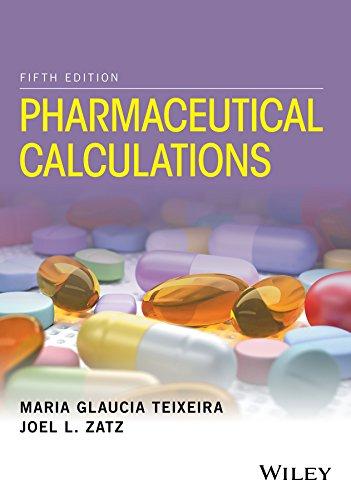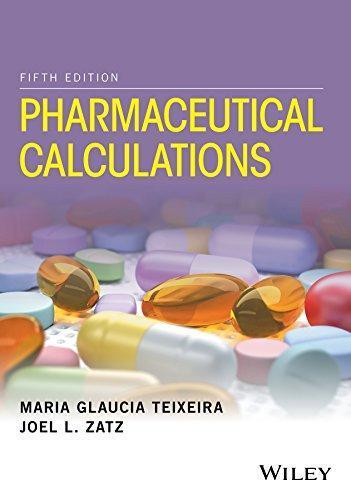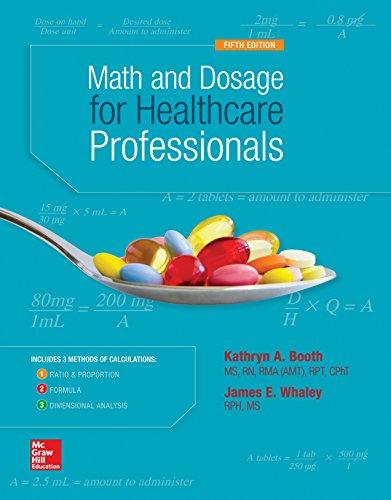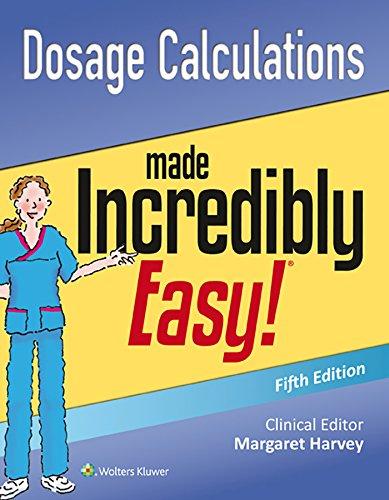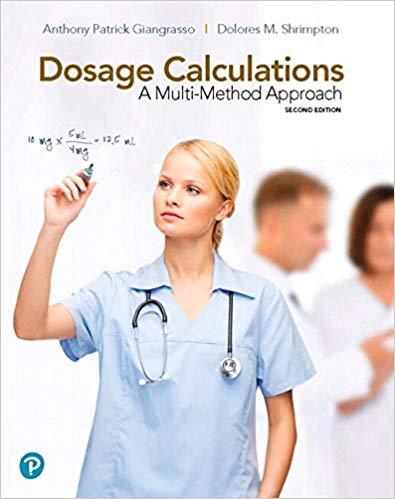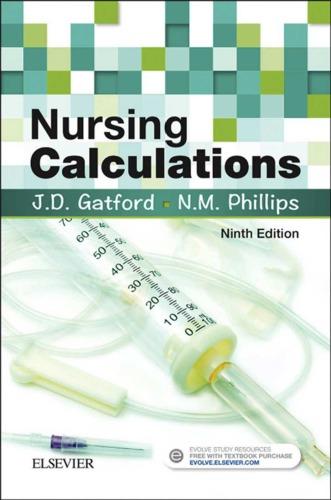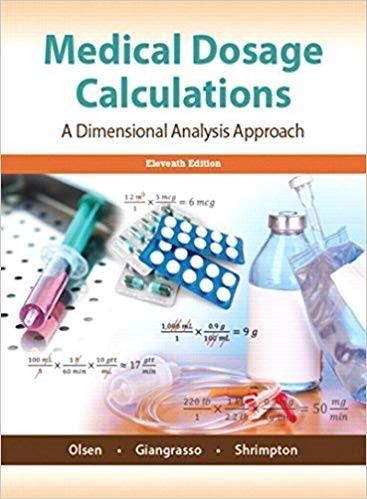REVIEW OF BASIC MATHEMATICAL PRINCIPLES
LEARNING OBJECTIVES After completing this chapter the student should be able to:
1. Recall the skills of basic mathematical operations required to work in the health eld.
2. Use estimation as a means of preventing errors.
3. Perform mathematical operations containing units.
4. Compare two quantities (ratio).
5. Apply ratio, proportion, and dimensional analysis in problem solving.
Pharmacists, nurses, doctors, and most health-related professionals perform basic calculations as a daily practice. While working in a variety of settings, pharmacists, for example, need to calculate doses and determine the number of dosage units required to fill prescriptions accurately, must determine the quantities of pharmaceutical ingredients required to compound formulas, and perform calculations related to dose adjustments for disease state management, and so on. The correct drug, strength, and amount of each medication prescribed that is dispensed in pharmacies must be finally checked by the pharmacist, who is legally accountable for an incorrect dose or dispensing of a wrong drug. The fact that most pharmaceuticals are prefabricated and not prepared inside the pharmacy does not lessen the pharmacist’s responsibility.
Modern drugs are effective, potent, and therefore potentially toxic if not taken correctly. An overdose may be fatal. Knowing “how to” calculate the amount of each drug and “how to” combine them is not sufficient. Of course, dispensing a subpotent dose is not satisfactory either. The drug(s) given will probably not elicit the desired therapeutic effect and will therefore be of no benefit to the patient. Clearly, the only satisfactory approach is one that is completely free of error. Absolute accuracy is any health professional’s goal. Since our goal when performing calculations is the correct answer, it is logical to suppose that any rational approach to a problem that results in the correct answer is acceptable. While this is true, some approaches are more coherent and practical than others. In this text we strive to use a method that requires as few steps as possible and that with which you will feel comfortable. Usually, the simplest, most direct pathway to the solution allows less opportunity for error in computation than does one that is more complicated. In this chapter, we will review some techniques basic to all types of calculations. To help you regain the basic mathematical operations required to work in the health field, we will briefly review significant figures, rounding off, fractions, exponents, power-of-10 notation, and estimation, and will make sure that you can solve simple algebraic
, Fifth
2017
Published 2017
Pharmaceutical Calculations
Edition. Maria Glaucia Teixeira and Joel L. Zatz. ©
by John Wiley & Sons, Inc.
by John Wiley & Sons, Inc.
expressions. We will go over how units participate in arithmetic operations and how we can take advantage of units in our calculations. Finally, we will review dimensional analysis, ratio, and proportion.
You will probably find that you are already familiar with all or most of these techniques. After this refreshing, you will make rapid progress through the self-study format of this text. If you need further review or instruction, that will be provided.
1.1. SIGNIFICANT FIGURES
Significant figures are digits that have practical consequences in pharmacy. Sometimes, in a calculated dose at a clinical setting, or in a weighed or measured amount at a compounding pharmacy, zeros are significant; other times they just designate the order of magnitude of the other digits indicating the location of the decimal point. Since the majority of medications currently prescribed are manufactured products, significant figures have minor significance to the counter pharmacist, if no compounding is involved on a daily basis. For the compounding pharmacist, however, all weighing and measuring will have a degree of accuracy that is only approximate, due to the many sources of error related to the type and limitations of the instrument used, room temperature, personal skills, attentiveness, and so on.
While compounding pharmacists must achieve the highest accuracy possible with their equipment, one could never claim to have weighed 5 mg of a solid substance on a torsion balance with sensitivity of 10 mg, or that 33.45 mL of a liquid was measured in a 50 mL graduate with only 1 mL graduations. Consequently, when writing quantities, the numbers should contain only the digits that are significant within the precision of the instrument. However, when performing calculations, all digits should be retained until the end. The final result will then be rounded so that the accuracy is implied by the number of significant figures.
The following illustrate the practical meaning of significant fi gures:
(a) If 0.0125 g is weighed, the zeros are not signi ficant and only indicate the location of the decimal point.
(b) For a measured weight of 1250.0 g, the last zero may or may not be signifi cant, depending on the method of measurement. The zero will not be significant if indicating the decimal point; alternatively, it may indicate that the weight is closer to 1249 or 1251 g, in which case the zero is signi ficant.
(c) For some recorded measurements, the last signifi cant figure is “approximate,” while all preceding figures are “accurate.” For example, in a measured volume of 398.0 mL, all digits are significant but it is accurate to the nearest 0.1 mL, which means the measurement falls between 397.5 and 398.5, or that the measurement was made within ±0.05 mL. In 39.86 mL, the 6 is approximate, with the true volume being between 39.855 and 39.865 mL. This means that 39.8 mL is accurate to the nearest 0.01 mL, or that the measurement was made within ±0.005 mL.
(d) It is thus possible to calculate the maximum error incurred in every measurement. Using the examples above, we would have
(e) When establishing the number of signifi cant figures in mathematical operations, use the following practical rules:
• The result of addition and subtraction should contain the same number of decimal places as the component with the fewest decimal places. For example, 12.5 g + 10.65 g + 8.30 g = 31.45 g = 31.5 g.
• The result of products and quotients should have no more signi ficant figures than the component with the smallest number of signi ficant fi gures. For example, 2.466 mg/ dose × 15 doses = 36.99 = 37 mg.
Now practice with the following:
(a) What is the maximum percentage error experienced in the measurement of 248.0 mL? 12.60 g?
(b) Determine the number of significant figures.
Amounts weighed
i. 4.58 g
ii. 4.580
iii. 0.0458
iv. 0.0046
Number of significant figures
(c) Which of the following has the greatest degree of accuracy (solve as in 3.5 mL ± 0.05 mL, accurate to the nearest 0.1 mL)?
15.7 mL ± 15.70 mL ± 15.700 mL ±
(d) Using signifi cant figure practical rules, calculate the following:
5.5 g + 12.35 g + 4.40 g = 2.533 mg/day × 5 days =
Answers
(a) 0.02%; 0.04%
(b) (i) 3, (ii) 4, (iii) 3, (iv) 2 significant figures
(c) 15.700 mL has the greatest degree of accuracy
(d) 22.3 g; 12.7 or 13 mg
SOLUTIONS
(a) The zero in 248.0 mL is a signi ficant figure, implying that the measurement was made within the limits 247.95 and 248.05 mL. The possible error is then calculated as
0:05 mL � 100% 0 02%
248:0
0:005 mL
Applying the same reasoning for 12.60 g, the maximum error is � 100% 12 60
0:0397% 0:04%
(b) 3, 4, 3, 2 signifi cant figures, respectively.
(c) 15.7 mL = 15.7 mL ± 0.05 mL, accurate to the nearest 0.1mL.
15.70 mL = 15.70 mL ± 0.005 mL, accurate to the nearest 0.01 mL.
15.700 mL = 15.700 mL ± 0.0005 mL, accurate to the nearest 0.001 mL. (The last measurement has the greatest degree of accuracy.)
(d) 5.5 g + 12.35 g + 4.40 g = 22.25 g = 22.3 g
2.533 mg/day × 5 days = 12.665 = 12.7 mg = 13 mg
1.2. ROUNDING OFF
The number of decimal places to which a medical calculation can be precisely calculated is determined by the number of signifi cant figures. As mentioned earlier, when performing calculations, all figures should be retained until the end, when rounding off is performed. Rounding off is based on the last decimal place. If it is �5, the preceding decimal place is rounded up to the next digit, for example, 2.356 = 2.36. If it is <5, the preceding decimal place is left as it is, for example, 2.33 = 2.3.
Practice rounding off with the following measurements:
(a) 2.344 g =
(b) 1.5 × 2.1114 mg =
(c) 5.246 mL (using a pipette calibrated 1/10 mL) =
(d) How many powder charts (individual doses) would a compounding pharmacist be able to prepare from a 10.5 g mixture of powders, if each chart should contain 1.33 g?
Answers
(a) 2.34 g
(b) 3.2 mg
(c) 5.3 mL
(d) 7.9 charts = 7 powder charts (doses must be accurate) and 0.9 g waste
SOLUTIONS
(a) In 2.344 the last decimal place is <5, so it is rounded to 2.34 g.
(b) 1.5 × 2.1114 mg = 3.167 = 3.2 mg, with only one decimal point because 1.5 is the least precise number in the operation (limiting number of signi fi cant digits) and it has only one place after the decimal.
(c) In 5.246 the last decimal place is >5, so it would be rounded to 5.25. However, the measuring tool is calibrated in 1/10 mL, which means only fractions as large as 0.1 of a milliliter can be measured accurately so 5.3 mL should be measured.
(d) 10:5g �
chart=1:33 g 7:8947 7:9 charts (10.5 is the least precise number in the operation). Since each dose must be complete, there is enough powder mixture to dispense only seven charts with accurate doses and 0.9 g will be discarded as waste.
1.3. FRACTIONS
Most math skills required in health care fields require handling fractions, which measure a portion or part of a whole number and are usually written as common fractions or decimal fractions.
A common fraction, frequently referred simply as a fraction, can be exempli fied as 1/5 13 or ,3/16or ,andsoon.The first or upper number, the numerator, identifies the number 516 of parts with which we are concerned, while the second or lower number, the denominator, indicates the number of aliquot parts into which the numerator is divided. When the numerator is divided by the denominator, the result is called the quotient.
When trying to perform pharmaceutical calculations with common fractions, you will find some principles and rules very handy:
(a) If the denominator of a fraction is 1, the value corresponds to the number in the 3 numerator, for example, 3. 1
(b) If the value in the numerator of a fraction is lower than the one in the denominator, then the value of the fraction is <1. If the numerator and denominator are the same, the value of the fraction is =1. Numerator with greater value than the denominator will generate values >1.
3 33
Examples: < 1; 1; > 1 5 32
(c) If both the numerator and denominator are multiplied or divided by the same number, the value of a fraction does not change. By the other hand, the value will increase if a number is multiplied by the numerator and will decrease if multiplied by the denominator. The opposite occurs if either the nominator or the denominator is divided independently.
3 � 26
Examples: 0:75 4 � 28
3 � 412 3 > as 3 > 0 75 4 44 3 33 < as 0 188 < 0 75 4 � 416 4
(d) Practical consequences of the principles described above, which will reduce computing errors, are as follows:
(i) The ability to reduce fractions to the lowest common denominator, or the smallest number divisible by all denominators in consideration.
Another random document with no related content on Scribd:
from her father, after his long illness in Melbourne. In it, he told briefly what Cyril had been to him through that trying time.
"I have not really known the boy till now," he wrote; "yet I thought I did—after all these months together. Jean herself could hardly have done more. I have never been allowed to want a thing. It was no use to suggest his leaving me more to the nurse, and taking his pleasure. She was no great shakes, certainly, and Cyril did not trust her. He was with me most of the day, and often at night; and if I remonstrated, his answer was, 'For Jean's sake!' Strange to say, he, never seemed overdone. Womanly gentleness is beautiful, but when conjoined with manly strength, it is past praise. He is growing into a fine fellow a thorough man, body and mind."
This was not quite the Cyril of Jean's knowledge—the coddled pet of Sybella, ready always to take care of himself.
"But Jem has often said there was more in Cyril than appeared. It is not fair to doubt him, without full proof—and I will not!" she repeated resolutely.
The glow of renewed confidence lent at once a different aspect to life.
Turning over another sheet, she came on a copy of the English "Times."
"Days old! Quite ancient! The very morning we left. I remember—the papers were late that day, and I did not see them before we started."
Jean skimmed column after column, to pass the time: her brain still busy in its back regions with Cyril.
"They will soon reach home now, if they really are off in the 'Spanish Gipsy.' A few weeks, I suppose—six or seven. Not likely that they should change, after once making up their minds; unless that story were true. But I will not believe it, until I know. If we should hear that they have actually started, then I shall be sure it is false. Cyril would never think of such a voyage—without need—if he were just engaged. My father could as well come home alone . . . The only thing is that fancy for Emmie Lucas! Otherwise I could laugh at the tale. Well—Emmie is heart-whole! That is one comfort. No harm done there."
Jean had an abrupt singular consciousness of receiving a blow. It might almost have been an actual physical blow, judged by sensation. Thought was scattered; and a grey haze descended on all around, coming like the fall of dusk. She sat motionless, gazing at the paper; hardly feeling; certainly not reasoning. The heavy blow came first, numbing her faculties, before the actual sense of those terrible words seemed to reach her understanding.
"LOSS OF THE 'SPANISH GIPSY!'"
The haze grew blacker, then partly cleared: and Jean read on:
"LOSS OF THE 'SPANISH GIPSY,' WITH ALL ON BOARD."
Not one saved! So much was clear. Jean's mind refused to grasp any further particulars. She was dazed with the shock, and could only watch fixedly, like a fascinated creature, the convolutions of the neat black letter-press, which took strange forms before her eyes, one shape dissolving into another, after the mode of kaleidoscope figures. Then she was far away from Rouen, out in the open sea; and great waves arose, dashing wildly; and there were
men, struggling, sinking—and Cyril's face, a blanched dead face, below the cruel breakers.
"I hope nothing is wrong, Miss Trevelyan! No ill news?"
Mrs. Newnham's question broke into Jean's vision, and with a strong effort she recalled herself, looked up, and answered quietly—
"The loss of the 'Spanish Gipsy.'"
"Ah, yes, to be sure—on the way home from Australia. Very shocking, was it not? Poor things! I hope no friends of yours happened to be on board."
Jean was silent.
"Such a sad event! And I dare say many of them had been out for years. After a bad storm, was it not?"
"I—don't know."
"Yes; that was it. I remember. There have been so many casualties lately; but I remember. Another ship, the 'Shannon,' had been signalled, and was coming to their help, because the 'Spanish Gipsy' had been so much disabled. And all at once, it was seen to capsize and go down. Not a moment's warning, and not a person saved. The 'Shannon' was too far-off to get to the spot in time— though it does seem strange that none of the sailors should have been able to keep afloat. Those things do happen sometimes: but it is really very dreadful—quite terrible."
Jean could not talk of the horror which had fallen upon her. And the pitter-patter of conventional pity, looking blandly on from a comfortable distance, was only a degree less
insupportable than the pitter-patter of conventional condolence would be.
She went back to the brief awful paragraph, which might mean so much to her. If they had started in the "Spanish Gipsy!" It all hinged there. One hand was put up to shield her face: and Mrs. Newnham, taking the hint, sank into silence.
Did the others know of this? Was it for this that Evelyn had hurried her away?
"So kindly meant! But what use?" she asked despairingly. "Nothing can undo it! And how can I bear to be here—out of reach? How can Evelyn bear it? If news were to come—But she will not wish to stay now—now I know it."
Jean passed quickly out of the room, sending no glance towards the old lady, whose very existence she had forgotten, and hastened upstairs. Entering the room, she found herself face to face with—Jem!
Jean showed no surprise, and forgot to shake hands. It seemed perfectly natural that Jem should be there. She came near, without a word, not knowing how altered was her own look. A quick interchange of glances passed between the other two. It was evident to both of them that Jean had some idea of the truth. Evelyn, much distressed, laid her hands on Jean's, which were rigid as iron.
"Mr. Trevelyan has so kindly come, dear," she faltered, "to— to see—if we—"
"No, no! To tell us—" urged Jean hoarsely. "To tell us—"
"Yes: to tell us just a little more. You are right. Dear Jean, we have tried to keep it from you, till we could be sure—and
we are not really sure yet. But I am afraid—Have you guessed anything?"
"Not guessed! A paper—downstairs—" Jean had difficulty in saying the words. Her throat seemed to close with the effort; and she waited impatiently for them to speak.
"What did the paper say?" Jem was uncertain still how much she understood. "Something about the 'Spanish Gipsy?'"
"I know! I know! Gone down! And they—they—they—" She turned on him a face of agony.
"Tell her!" begged Evelyn, bursting into tears. "O tell her quickly."
"We cannot be absolutely certain of anything yet," Jem said, in his quietest manner. "I want you to understand this—not to be sure, until we really know. Still, I am afraid things do look bad. I sent a telegram to Melbourne the day you came away, asking whether or no they had started, and the answer has been unaccountably delayed. It ought to have arrived in a few hours, and I did not get it till this morning. But—"
"Yes! Yes! But—!" repeated Jean hoarsely. "Go on!"
"It is very short—only two words, and no particulars given. 'Both off!'—that is all it says. Whether by long sea or by Suez we cannot tell. There is no mention of the 'Spanish Gipsy.' I am disappointed to hear so little, and I have sent a second telegram asking for more information. It ought to come quickly—but meantime I hardly felt that it would be right to delay telling you—or at least Mrs. Villiers—what I had heard. So I came away at once. If only I could have brought something better!"
"Both! Both at once! Oh, it can't be! Not both!"
Evelyn's sobs were distressing: but Jean shed no tears. She looked bewildered.
"Impossible! Not both! Evelyn, don't cry so! What is the good? They will come home. It couldn't be—both of them!" Then to Jem—"We must go back at once. I can't stay here. You will take us—will you not? We could reach Dieppe in time—for the night-boat, I mean. I'll help Anderson. Evelyn needn't touch a thing. Only please not to stay here. Evelyn dear, don't let us."
She wrung her hands together, with a strange forlorn gesture, unlike Jean.
"Don't talk to me—about that, I mean! Don't pity me! We must not stop to think of anything—only just get off and then—I don't want water, Jem! What is that for? You don't suppose I'm hysterical, do you? But I'll drink some, if you like. It doesn't matter. I only want to get away as fast as fast as possible. And then—Evelyn, do, do stop crying! I don't know how to bear it. And what is the use? They must come home! It couldn't be—both of them! Don't hold me, please. I want to go."
"One word first! Jean, listen to me. The Mrs. Parkinson who wrote last week about Cyril being engaged, has written again; and now she contradicts that—says it is untrue!"
Jean's face relaxed its rigidity.
"She did mean Lilias Mackenzie—and Lilias Mackenzie is engaged to somebody else. Mrs. Parkinson saw Cyril, and she says he was all impatience to get home—so eager to be off."
"Poor Cyril!" whispered Jean, every feature quivering.
"He was true to you—I am sure he was."
"He—is true!"
Jean disengaged herself, stooped to kiss Evelyn, and was gone.
Half-an-hour later she reappeared, almost her usual self; only with reddened eyes and strained look; still urgently entreating to start immediately. For almost the first time in her life, she forgot to think of others, under the pull of this intense desire. Evelyn made no difficulties; and Jem believed that to be on the move might be best for both of them. As Jean had said, they could reach Dieppe in time for the night-packet, which did not start till after one o'clock in the morning.
CHAPTER IV. ROUGH
WINDS.
"Loud the angry wind was wailing." LONGFELLOW.
JEM had crossed the Channel many a time, but he had never known a rougher passage. Until they were well out of Dieppe harbour, nobody—not even the experienced Captain —had imagined what the force of wind and wave would be: or certainly Jem would have insisted on delay, notwithstanding Jean's impatience to be off. Such weather is rare in May, when one expects to have done with the worst gales of winter and spring.
Repeatedly in the slow hours of that boisterous night and early morning, Jem wished that they had not come. The trip bid fair to outlast considerably its orthodox length of four hours. Dawn was beginning to break, and they were still in mid-Channel, only about half-way over. The sea was so heavy, that it had been early found needful, for safety's sake, to slow down the engines; and advance was tardy. A large proportion of the passengers were too entirely prostrated by sea-sickness to pay close heed to the flight of time: but Jem and Jean were first-rate sailors.
Jem retired only for an hour or two; then he came once more on deck, preferring to keep watch. It was no easy matter to maintain footing on a floor which each instant assumed some new slope, trying almost every conceivable position except the horizontal. He soon ensconced himself in the most sheltered spot he could find, not far from the companion-hatch, there to study at leisure the conflict of forces.
Faint gleams of light stole over the waste of watery hills—a grey landscape of long broken ranges, sliding swiftly one after another in a never-ending progression from the westnorth-west. Snow-tipped summits reared themselves, mountain-like, the dark crests being rent into white foam, and torn away by the gale. It was a scene never for two instants the same, yet ever repeating itself, as vast bluffs of
water rolled past and under—sometimes partly over—the straining vessel. Each time a sea was shipped, there was, with the shock of concussion, a rush of the broken wave.
Jem escaped, in his corner, most of the flow, but he came in for drenching showers of spray; and rug and macintosh failed to keep him dry. Still he sat on: and but for certain saddening circumstances, he would have enjoyed the hurlyburly of excited elements.
He was grieved both for Evelyn and Jean: yet no doubt it was Evelyn mainly who filled his thoughts. Matters in that direction had of late severely tried Jem's fortitude. To see Evelyn in trouble, and not do his utmost to comfort her, was hard of endurance. It was the old pain of years gone by, revived and intensified. If Evelyn were happy, he could bear bravely for himself the long suffering of life apart from her; but if she were sad, he was wretched. Perhaps not many men love so unselfishly.
All the hours of this stormy night, she was never out of his mind. He had gone through a spell of fierce battling, during many months past, unknown to those with whom he lived; and things were nearing a climax. Jem had felt lately that the fight was too sore for him. Health and spirit threatened to break down beneath it. A question as to his future had arisen in the shape of an offered living—a large London Parish, among the very poor, yet not so far East that he might not, perhaps, venture to have his mother with him, for at least part of the year. The income, though less than that of Dutton, would still enable him to keep her in comfort.
For three days he had carried the letter about, unable to arrive at any decision. Now, he determinately faced the
matter, alone in semi-darkness, on the heaving deck, with a world of troubled waters around.
In the light of threatened separation, he found out how he had grown to depend on occasional meetings with Evelyn—a glimpse here; a word or smile there—to carry him on. He discovered how desolate life would be without her, beyond reach of her sweet face and voice. A life not worth living, he could almost have said—if any good and right feeling man might dare to say such words, in the blaze of his responsibilities, and of the work given him to do.
"The more need for me to leave Dutton! It is making me useless," was what Jem did say. Few would have endorsed the assertion, yet it expressed a positive danger.
He never had sought to win her: so much Jem could aver. He had resolutely restrained himself; had treated her with mere grave kindness and courtesy; nay, he had even forced a certain sternness, a certain coldness, to cover his burning devotion. The love of a strong man of thirty-five, which has slowly grown for years, in the face of hopeless obstacles, is no light thing. Jem was not like Cyril. He could never hesitate as to whom he loved. Once and again, with all the force of his vigorous Trevelyan nature, he had stamped his passion under foot, and had for a while counted it slain; but always, like a phoenix from the ashes, it had sprung up anew: and at last, he had ceased to think of destroying a thing of such vitality. So far he had been able to hold it in leash. Now, nothing remained but to flee.
Which would mean a manner of slow dying—the death of all joy in life, except such joys as are unearthly. Jem had them in possession!
Only money stood between, to hinder his seeking and perhaps winning her—but it was a potent "only." If she married him, she would lose her all, beyond a mere pittance —so Jem believed—and what had he to offer her instead? Not even Dutton living for life! Whether or no, he accepted this present offer—and there seemed no reason for not doing so—he counted himself in a manner devoted to EastEnd work, for sooner or later . . . Evelyn the wife of a clergyman, with narrow income, toiling in back-slums! Jem could not picture it. Yet there might be capabilities in that fair creature, not yet developed; and Jem had seen in her some faint dawnings of a high spirit of self-devotion.
Had he had any reason to believe that she loved him, unsought—then of course he would have spoken: then of course he would have given her at least the choice. But he had no reason to believe anything of the kind; and he could not in conscience set himself to win her.
Another watery mountain, towering above its compeers, swept up, and struck the steamer with a force which made every plank in her to vibrate. When the rush of water and the hail of spray had cleared, Jem became presently aware of a difference in the sum-total of sounds. The steady throb of the engines was ceasing. He waited a few minutes, not flurried though anxious; but it did not recommence, and he went aft, to make enquiries.
"Jean! You here!" Coming back to his seat, he found her.
"Don't scold me, please. I could not stay down any longer."
"It is not fit for you on deck."
"I can't go back directly—the hatches are closed again. And I would rather not. We are so boxed up below. Some gentlemen were coming up, to ask what had happened; and one of them was kind and helped me. I wanted to find you: and when I saw your rug, I knew you would soon be back."
Jem wrapped her round with the said rug.
"I don't want it," protested Jean uselessly. "I have my waterproof. Why have the engines stopped?"
"Something wrong with the starboard paddle-wheel."
"I don't understand."
"That green wave did a lot of damage—carried away the driving-arm, and broke the radial rods. It is what they call a 'feathering paddle-wheel.' There is nothing now to control the floats. The fear is, if the engines are started again, that the loose floats may break in the side of the steamer."
"And—sink us?"
"Things might come to that."
"What are we to do?"
"Let ourselves drift for a time. There seems to be no other choice. The risk of using the paddle-wheel is too great to be ventured on—unless as a last resource; and we have not come to last resources yet. So long as we have plenty of sea-room, we are hardly in actual danger. The difficulty is as to steering. The sea breaks through the wheel incessantly. But they are contriving some sort of apparatus, to prevent our drifting too fast, and to keep the boat's head to the wind."
"When shall we reach Newhaven?"
"Not much hope of Newhaven at present. With this headwind, I suppose we shall drift over towards the French coast and up Channel. By-and-bye we may fall in with some other steamer, and be taken in tow . . . It is patiencetrying."
"If I had not been so bent in coming by this boat—!"
"Something else might have happened, equally unpleasant. Nobody knew, till we were off, how rough it would be. There's a grand wave! . . . You won't often see a finer sight! . . . Sit close! We shall be drenched! . . . Whew!"
"I should enjoy it—any other time!"
"Remember, there is no absolute certainty about them, I mean! At the last moment they may have changed their plans, and come by Suez."
"Not if the passage were taken. Why should they? . . . Is it any use to let myself hope?"
Jem had no difficulty in hearing Jean's clear intonation, even through the babel of wind and water. Conversation was perforce fitful, containing many breaks: but the two were as quiet as if seated in Dutton Rectory study.
Jean's next words came after an interval—
"Drowning is not a painful death, is it?"
"No, not painful. This is generally agreed upon, I think . . . Would you not be wiser to leave details, till we know more? One goes through needless misery sometimes, picturing what has never happened. They and we are in our Father's
Hands. Try to remember that—and to trust . . . What do you think of my going back to London work?"
"And leaving Dutton?"
"I have had an offer of a living."
Jean was buried in thought, and Jem had ceased to expect an answer, when she said—
"I shall have to come and work there too—if You would let me, would you not? Unless Evelyn and I came and lived together! It has been her dream for years."
"Mrs. Villiers!"
"She said so the other day! . . . Oh, what a wave!"
"Hold fast! . . . Yes—you were saying—"
"She has often talked so—especially of late. Evelyn gets so tired of her present life. She would like to give it all up, and take to East-End work as a vocation . . . I don't think the wish is only restlessness. Sometimes she talks as it were— but that is because she is so honest—so afraid of laying claim to higher motives than she has. Evelyn does think and feel very deeply—and her religion is always so true—though she talks very little. I am sure the wish is a real wish; not mere disgust with Dutton and the Park . . . Isn't it strange that Cyril should have written so often lately of London work of that kind? He says he can't settle down at his age to a do nothing existence at the Brow. He would like to spend part of the year in Town, and look into all sorts of questions, and help a little to improve things at the EastEnd. But no use talking," murmured Jean. "When perhaps —"
Jem hardly heard the last few words. That which she said about Evelyn stirred him strongly, seeming to clothe the condition of things with a new vesture of possibilities.
Four o'clock in the afternoon, and still the hapless passengers were at sea, exposed to the fury of wind and wave. Hour after hour had crept by; and the "Bristol," with her damaged wheel and silent engines, drifted slowly, loglike, across the Channel, and towards the French coast.
One friendly steamer, the "Achilles," had been signalled in the course of the morning, and had come to their aid. With great delay and difficulty, and no small peril of a collision, she had been manœuvred into a position near enough alongside to take on board the tow-rope of the "Bristol." For a while hopes rose high; but in so heavy a sea, the strain proved to be too great.
After two hours, the powerful hawser snapped as if made of tinder; and to pick it up again was not possible. The wind had by this time fallen to some extent; but the seas still chased one another in mountainous grey ridges with wearisome monotony.
Though the "Achilles" could do no more, she showed her sympathy by lingering long in the neighbourhood of the hapless vessel; till indeed the fast-nearing outline of the French coast, and an ominous line of breakers on a rocky shore, seen in glimpses between the rising and falling of watery heights, spoke of peril to both steamers. Then the "Achilles" was compelled for her own safety to stand out to sea: and the "Bristol" drifted alone.
Passengers and crew had behaved well thus far. There were several ladies among the former, and some had been much overcome: yet weeping was quiet, screaming and hysterics were unknown. Many were still suffering too severely from mal de mer to pay attention to surrounding circumstances: while others knew of the now pressing danger, and bore it calmly.
Boats were in readiness for launching; life-belts were either donned or kept at hand by a large proportion of those on board: and one gentleman had already pulled off his heavy boots, in preparation for a swim.
Among those able to be on deck were not only Jean and Jem, but also Evelyn. She had rallied from her weakness, the near peril acting as a tonic, and had insisted on leaving the cabin. It might be that a summons would soon reach all below to follow her example. Jem had helped her to his favourite corner, the most sheltered attainable: and he sat beside her, keeping careful watch over her comfort. He looked worn with his long night-watch and inward battling, but a vivid light shone in his eyes, as they drew closer to the coast. To die with Evelyn seemed to him no terrible matter; not half so terrible as to cut himself asunder from her, living.
Evelyn had her gentlest and most fragile aspect; and her large eyes watched with fascinated eagerness the rolling up and past of each great wave which tossed and heaved their boat, like a huge log, on its bosom. Yet fear was not in her face; rather a restful quiet might be found there. Jean, standing at a short distance, keeping her feet in a manner which no other woman on that sloping deck could emulate, saw this with silent wonder. She had expected more of physical fear and shrinking on Evelyn's part. Could it be, not only that to Evelyn's gentle spirit the great transition now
threatening was not a matter for dread, but also that under Jem's watchful care a new content had arisen. The thought came, which strangely had never before occurred to Jean— did Evelyn love Jem?
"Another half hour, and we shall be on the rocks!" a passenger said aloud.
Evelyn heard, and her glance went in appeal to Jem.
"Hardly so soon," he answered.
"Can nothing be done?"
"The engines will be set going. I do not suppose the Captain will wait much longer."
"And if the wheel breaks in the side of the steamer—That is feared, is it not?"
"Yes. Then we should have, probably, to take to the boats."
"Would the boats live in this sea?" asked Evelyn.
"That is the question."
A faint smile came to her lips, drawn there by something in Jem's look.
"Jean must be your first care," she said.
"None can be my care before you! Jean too of course. If we take to the boats, we will keep together—all three of us."
"But if you could not save us both—Jean must be first. She is so young. And for Cyril's sake!" urged Evelyn. "It does not matter so much for me. I have had my life, you know . . . And sometimes I think—One would not wish to choose;
but going Home early would solve many difficulties. If it were God's will for me, I mean. I don't think I have been so very happy."
"Ought you not to have been?"
"Why—'ought'? I am so alone—for years past, always alone. People seem to think money is all one needs; but I care little for wealth. If you knew how little! It is only a burden . . . I should like to thank you now for what you said to me, one day lately—the day we met and had a talk. It opened my eyes to a good deal. If we get through this, I am resolved to live a different life—not for myself any more. So many need helping; and I should like to help them. I will find some work to do."
Jem's answer was more of a reply than might appear on the surface: "I have thoughts of going back to London."
"To leave Dutton?"
"It will be best."
"For Dutton? Or for yourself?"
"For both, perhaps; certainly for myself. There are difficult elements in my life at Dutton; and I have always felt that my true work lay among the London poor."
"Ah—I have always felt that that was a life worth living!"
"Any life may be, and ought to be, worth living, if there is a right motive-power."
Jem said this almost mechanically. Recollections of a long past scene flashed through his mind; of a meeting in the gorge; of the General's fair young wife looking with sad
eyes, as she said, "It must be a splendid life—a life worth living—so different from most people's lives!"
The remembrance stirred Jem strongly. He almost forgot his present position; and a new impulse came over him, to speak out, not to leave her in ignorance of his love. What Jean had said of Evelyn, and what Evelyn now said of herself, seemed to place matters on a new level. Jem could hardly have told what he thought or expected; only the fresh impulse was overmastering; and he seemed to be suddenly freed from binding shackles. Perhaps in the near prospect of possible death, questions of more or less money grew small, as if seen through a reversed binocular; perhaps the long night and day had unstrung him; perhaps Evelyn's unconscious confiding wistfulness of look and manner had most to do with the breaking down of his resolution. One way or another, he heard his own voice saying, almost without premeditation—
"If I were not poor and if you were not rich—I should have asked if you could share that work with me. But as things are—"
A moment's silence; and then—"Why not?"
Jem glanced up, hardly able to believe his own ears. Below the surface, he was tempest-tossed; long pent-up forces surging in billows like those grey heights around. A dazzle of light filled the murky air, and everything was pulsating with a new vividness of life and hope. He grew excessively pale; yet he spoke with restrained utterance:
"Because it would be asking you to give up everything—in exchange for nothing!"
"But if I do not value the 'everything'? And if that 'nothing' is perhaps 'something' to me?"
"You must understand! I have only my stipend—and my mother to support. Don't you see?" asked Jem, with less composure.
The throb of the silent engines seemed to have passed into his brain; and he scarcely knew what he said under this strange clang of sound and brightness of light, through which he heard Evelyn's low tones, inaudible to everybody else, and saw her sweet face, fair still to him as in all the freshness of her lovely girlhood; while the rush of wind and water faded into nothingness.
"I did not mean to say this! I hardly know why—except The thing cannot be—ought not to be! . . . Still—if we should not get through—or if you are saved, and not I— then I should like you to know that I have loved you for years—have loved you always. I have never loved any other —since the day that I first saw you, coming over the stepping-stones!"
"So long ago! All those years!" said Evelyn.
A bright rose-colour flushed her cheeks, and the deep blue eyes, looked up at Jem, had lost their unsatisfied craving.
"And I thought you almost despised me—looked down on what seemed to you my butterfly life."
"When I would have given all I had—any day—for a look or a word! But you mean—you think—" Jem could hardly speak —"you mean, you could give up—you think you could learn to love me?"
"I think I have learnt that already," she answered softly. "And the giving up would be no giving up—because of what I should have in exchange."
The engines had been started again, as they talked, and now so terrific a clamour of sound burst from the damaged wheel, as it began slowly to revolve, that Jem's reply was lost. What matter? Enough had been said!
CHAPTER V.
SUCCEEDING CALM.
"She's beautiful, and therefore to be woo'd: She's a woman, and therefore to be won."
SHAKESPEARE.
THE dreaded peril did not develop into fact. Those massive loose floats, made of steel and weighing between two and three tons, though they struck heavily, with a frightful crash, against the framework, did little injury to the side of the vessel. The steamer drew gradually away from the threatening line of breakers; and thenceforward the worst was over. So often the thing which we most fear does not come upon us.
Jem had telegraphed home before starting; and he well knew what his mother's anxiety would be, at this long delay in their arrival; but nothing could be done. Until they should
reach port, no word could be sent. They were cut off from communication with the civilised world.
Progress homeward had to be of the most tardy description, since the Captain dared only to use the engines at their slowest rate. It was a matter of snail-like creeping, inch by inch, little more than a mile an hour; and another dreary night had to be lived through by the suffering passengers. Only Evelyn and Jem seemed none the worse—nay, rather, much the better—for their uncomfortable experience.
Jean gazed wonderingly at them both many times in the course of the evening; but she asked no questions, and they would not thrust their new-found joy into her burden of fear and sorrow.
Evelyn could sleep that second night peacefully as a child; but not Jean. She came on deck before breakfast, looking haggard. The wind had changed and gone down; and the sea had grown more still, heaving in sleepy billows, like the tired sighs of a child after a fit of passion.
"How soon do we get in? The engines are stopping again," Jean said, a despairing under-tone audible.
Jem showed a small steamer near at hand. "A tug at last! We shall be all right now. Our little friend will tow us to Newhaven."
"I thought we were to land somewhere else."
"So it was said yesterday; but we go to Newhaven, after all. I am glad for your sake. If a telegram has arrived, it will be sent there to meet us."
"I have had a lesson, at all events, not to be wilful again," said Jean. "If I had not been so bent on getting off—"
"It is nearly over now, I hope. Have you had anything to eat?"
"No. Why won't you let me blame myself?"
"So you shall, if it is a relief. But there is another side to the question. I shall be thankful all my life that we did come."
"By this boat?"
"By this particular boat! If we had not, Evelyn and I might never—"
Jem paused, and Jean repeated—"Evelyn!"
"I may call her so now."
"Then it is that! I almost fancied—and yet—O Jem, I am glad!—Glad somebody is happy! And Cyril would have been so pleased."
"Will be—perhaps. We won't give up hope yet."
"I have not much left. But this—is it real? You mean it!"
"Nothing was ever more real. I don't wonder you ask the question. I keep putting it to myself. All is changed—like a bewildering dream. I didn't know what capacities for happiness I had! . . . Yes, it is real—that she loves me— better than Dutton Park."
"And you will stay in Dutton?"
"I think not. There is no need. We both long for London work; and Evelyn has more of her own than I knew. A legacy of £600 a year was left her lately by the General's brother-in-law. Marriage will not touch that. So we can afford to provide for my mother, if she likes a country home
best; and somebody else will be as well fitted as I am to look after the old ladies of Dutton."
Jem could not resist the little flash of fun; but he grew instantly apologetic.
"Forgive me! It must sound so heartless. But if you knew what this is to me—after years of utter hopelessness!"
"I think I do know; and you could never be heartless," Jean answered.
To Evelyn, a little later, she murmured—"So this is what has been the matter with you lately—not poor Miss Moggridge, after all!" and Evelyn offered no protest.
A small tug, with a large steamer in tow, could not be expected to advance rapidly; and the "Bristol" had drifted far out of her course; but the sea being now comparatively smooth, the Captain preferred to make his own port. Passengers, eager to be on land, were disposed to grumble; yet the delay involved was not very great. There was no longer any question of danger; only of patience. People might eat and drink and enjoy themselves, so far as certain physical sensations permitted.
It was growing dusky, when late in the afternoon, they reached the Newhaven harbour. An eager crowd of battered and weather-beaten voyagers pressed across the gangway, anxious to reach firm ground. Evelyn, clinging to Jem's arm, seemed to care little whether she were on deck or on land; and Jem could scarcely turn his mind to aught else beside Evelyn. Still they did not forget Jean, and if she stood apart, she was at once beckoned near.
After crossing the gangway, however, while in the midst of a dense crowd, Jean was forcibly separated from her companions, and hustled backward. She had little spirit to struggle; and though not much liking to find herself alone, she could hardly be called nervous. When able to move forward again, she looked about in vain for Evelyn and Jem. Had they gone on, forgetfully? Jean smiled at the idea; yet a forlorn wave swept over her, not for the first time that day. The contrast between their happiness and what might be in store for herself was almost too painful.
In the growing darkness, and in the throng, she still failed to catch a glimpse of her companions. Jean began to feel uncomfortable.
Then she found somebody by her side—somebody well covered with a large foreign-looking cloak, and wearing a rough-weather cap, pulled low over his eyes. She had a glimpse of a brown-moustached face. And an ungloved hand, well sunburnt, touched her courteously, to draw attention; while an odd gruff voice, not unfamiliar in its intonation, said—
"Pardon me! Miss Trevelyan—? Mr. Trevelyan has gone on, and he desires me to bring you to the hotel."
"Rather curious!" Jean thought; but the manner was unmistakably that of a gentleman, and Jean submitted. "A friend of Jem's!" she conjectured.
"You have had an unpleasant voyage."
"Very," Jean said, with sufficient brevity, as she walked by his side.
"Mr. Trevelyan asked me to inform you that news has come from abroad—good news."
"A telegram!"
"That—and more!"
"My father and—"
"They did not go in the unfortunate 'Spanish Gipsy.' There was a change of plans just at last. Both are safe and well . . . I think you had better take my arm."
For a moment, Jean was rather near loss of consciousness. Long suspense and want of sleep had told upon her; but with a determined effort she rallied, after her father's fashion.
"Thanks—no need. You are sure—quite sure?"
"Perfectly. There can be no mistake. They did take their passage in the 'Spanish Gipsy;' but soon afterwards, they managed to get off at some little sacrifice of money. The fact is, Sir Cyril had not patience. He was anxious to get home; and the long voyage meant too much delay. They would not write word of this change, thinking that it would make a pleasant surprise; and they have come straight by Suez."
"Have come! Then they are now—"
"In Newhaven! Waiting for your arrival. Mr. Trevelyan is at the hotel—and Sir Cyril—is—"
The stranger hesitated: paused near a lamp; pushed higher his penthouse of a cap; and said in a different voice—
"Jean, am I so changed?"
"Cyril!!!"
"And so, Mabel, everything is settled, and they are all going to be married as fast as possible, don't you know?" stated Mrs. Kennedy, a few days later, to her usual confidante.
Mabel, having been absent from home, required instruction on the recent course of events.
"I don't know, I'm sure, why they should wait. Sir Cyril has plenty of money; and now that funny Mme. Collier is coming to live again at Dulveriford Rectory, why, nobody can say Jean can't be spared."
"She'll make a splendid Lady Devereux—as nice as any one could wish. As for poor Miss Devereux, why, she must just make up her mind to it. But they say she was as nice as anything when Sir Cyril came home, and cried in his arms, like I don't know what—having been so frightened about him, and all, don't you see? That does soften people sometimes. And, after all, she isn't hard—she's only just Miss Devereux. And she's to have a sweet little house built, and everything done to make her comfortable. So she can't complain."
"Not that we shall have so very much of Sir Cyril and Jean in Dutton. I can see that! They're all agog for London, and East-End work, and no end of philanthropicalness."
"It's wonderful how Sir Cyril is altered. I wouldn't have believed it—after less than two years and a half. Why, he looks positively ten years older, I do declare, Mabel; and he's bigger, and stouter, and regularly burnt brown, and he's grown a moustache, and his voice is deeper too. He's nothing like as pretty as he was. I always did say he was the prettiest boy, with the loveliest manner—but then, of
course, he can't be a boy always, don't you know, and he's got nice manners still. You can fancy how he's changed, for Jean herself didn't know him when she first saw him in the dark. But if Jean likes him better so, it's all right; and she says she does."
"As for Mr. Trevelyan, he looks quite young and strong again, and he goes striding about like a great long-legged emu!"
"And we're to lose Mr. James Trevelyan! That seems a shame, and I'm desperately sorry—though to be sure the Colonel does say he's not at all a safe young man, and poor dear Thomas shakes his head. But some people always shake their heads over everybody, don't you know; and there's nobody I'd rather hear preach; only, of course, you mustn't tell Thomas! But it does give one a sort of lift—up out of the mud, you know."
"Mrs. Trevelyan? Oh, she's to spend half the year in London with them—and half the year at the Brow. That's the plan, I'm told. She says she's so glad for 'dear Jem' she always calls him 'Dear Jem,' you know—that she can't think of herself. And Mr. James Trevelyan is all beaming, and Mrs. Villiers looks as young and lovely as she did at sixteen.
"Poor dear creatures! They all think everything is to keep straight after marriage. A sort of comfortable wind-up, don't you see, and nothing ever to go wrong again! Of course, it won't—I mean, of course it will—at least you know what I mean. Things will get crooked just as much as ever, and perhaps a lot more. Why, if nothing else happens, there's a husband to look after, and everybody knows what that means! If they don't, they soon will."
"Of course, they'll be awfully happy, dear, and it all fits in beautifully, and it's just exactly what one wishes. I always did say Mr. James Trevelyan was the right person for Mrs. Villiers; and Sir Cyril has been crazy after Jean ever since he wore knickerbockers. But, all the same, I suppose they'll have their needles and pins, like other folks. Married life isn't just nothing but plum-cake, you know."
Mrs. Kennedy's metaphors were apt to get mixed, but she smiled on in placid unconsciousness of the incongruity.
"Miss Moggridge says it's so wonderful how one event grows out of another; and I suppose it is; only it would be more wonderful still if they didn't. She's a queer sort of woman, Mabel—intellectual and all that!—but she's quite too much for me, don't you know? And she's going to live at Rome."
"So it's all settled; and now there's nothing to be done but to publish the banns, and to get the frocks and veils!"
